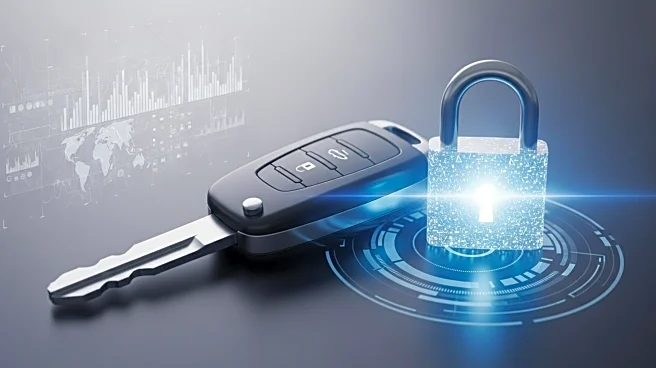What's Happening?
The automotive industry is increasingly focusing on software-defined vehicles (SDVs) as the future of mobility, but cybersecurity concerns are rising among consumers. Recent research indicates that 65% of drivers believe remote hacking of vehicles is possible, and 70% would consider purchasing older, less connected cars to mitigate cyber risks. This apprehension is not unfounded, as vulnerabilities in systems like Subaru Starlink and Nissan Leaf have allowed remote access to sensitive data and vehicle functions. In 2024, 92% of automotive cyberattacks were executed remotely, highlighting the potential for direct harm to users through compromised vehicle systems. The integration of connectivity and advanced driver-assistance systems (ADAS) in modern vehicles increases the risk of cyber threats, necessitating robust cybersecurity measures to ensure consumer safety.
Why It's Important?
The significance of cybersecurity in the automotive industry extends beyond data protection to encompass physical safety. With vehicles containing millions of lines of code that control critical functions like steering and braking, a single vulnerability can lead to dangerous outcomes. The infamous Jeep Cherokee hack of 2015 demonstrated the potential for remote manipulation of vehicle systems, underscoring the need for secure software development. As automakers transition into software companies, the integrity of their software directly impacts vehicle safety and consumer trust. Ensuring cybersecurity is integral to maintaining consumer confidence and advancing the adoption of connected vehicles. Automakers must prioritize security from the outset, utilizing tools like Software Bills of Materials (SBOMs) to manage risks and enhance resilience.
What's Next?
Automakers are expected to implement proactive cybersecurity measures, including runtime protections and over-the-air updates, to address vulnerabilities swiftly. The industry must also focus on securing the software supply chain, as third-party components can introduce hidden risks. By correlating software elements with public vulnerability databases, automakers can accelerate patching and streamline incident response. As autonomous and driver-assist systems become more prevalent, cybersecurity will be a fundamental safety requirement, akin to airbags and braking systems. Automakers that demonstrate robust security practices and communicate these protections effectively will likely gain consumer trust and drive the adoption of connected vehicles.
Beyond the Headlines
The ethical and legal implications of automotive cybersecurity are profound, as failures can lead to accidents, injuries, or fatalities. The industry faces the challenge of balancing innovation with safety, ensuring that advancements in vehicle technology do not compromise consumer protection. The development of secure software is not only a technical necessity but also a moral obligation to safeguard public safety. As the automotive landscape evolves, manufacturers must navigate complex regulatory environments and consumer expectations to build trust and drive progress.









